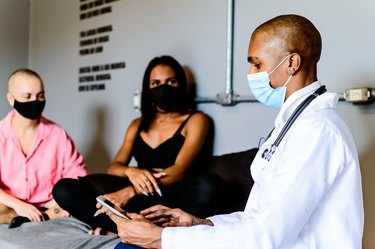
While few people look forward to a visit to the gynecologist, for people who are nonbinary, gender diverse or transgender, these appointments can be deeply distressing, surfacing memories of previous medical trauma or triggering gender dysphoria.
In fact, a 2021 report from the Center for American Progress (CAP), Protecting and Advancing Health Care for Transgender Adult Communities, found 28 percent of transgender people surveyed put off seeking necessary medical care. Small wonder, when nearly half of the survey respondents had "[experienced] mistreatment at the hand of the provider" in the previous year, including physical or verbal abuse or being refused medical care.
Video of the Day
Video of the Day
"I'm not very excited to have anybody examine my body — especially that part of my body," Schuyler Bailar, the first Division I transgender NCAA men's athlete, and author of He/She/They: How We Talk About Gender and Why It Matters, shared on Instagram in the moments before his second Pap test.
But, as Bailar and the medical experts we spoke to all point out, these visits matter. As well as the cancer screening that happens during an ob-gyn appointment, it's also an opportunity to discuss family planning, be tested for STIs and receive important preventive services.
"Patients require and should get preventive health care, maintenance and cancer screenings of any anatomic body part that is still present," says ob-gyn Clayton Alfonso, MD. These cancer screenings include Pap tests to screen for cervical cancer in anyone who has a cervix, and mammograms and other breast cancer screenings for those with breast tissue.
If you're a trans person who has been holding off on making an appointment, here's what to expect, and tips for a smoother experience.
Finding a Trans-Friendly Gynecologist
The first step is to find a trans-friendly gynecologist, who will provide sensitive, affirming service. If you have a primary care provider who you like, start by asking for a referral. You can also:
Lean on Word of Mouth
Start by asking your local network for their recommendations, Dr. Alfonso says.
This is also a moment for social media to shine. Facebook groups, TikTok and subreddit communities on Reddit are often a source of information and physician recommendations, says Ashley Turner, MD, an ob-gyn with Northwestern Medical Group and an assistant professor at the Feinberg School of Medicine.
"I have such a large amount of patients who tell me they hear about me from just word of mouth," notes Catherine Nosal, MD, an ob-gyn with Northwestern Medical Group. Both Drs. Turner and Nosal are part of the Northwestern Medicine Gender Pathways Program, which provides gender-affirming care to transgender and gender nonbinary patients.
Contact Centers and Affinity Groups
"A lot of cities, even smaller cities, may have an LGBTQ group in the area that they can reach out to," Dr. Alfonso says. You can ask these groups or centers if they have any lists of supportive health care providers.
Search Online, and Check Practice Websites
"I always hate to direct people to Google. But internet searches are important," Dr. Alfonso says. You can try searching "trans health" and your city or state.
Another option: Check the websites of LGBTQIA+ health organizations, Dr. Turner suggests. For instance, Fenway Health in Boston or Howard Brown Health in Chicago may be able to share resources and providers in the greater northeast and midwest, respectively. The Transgender Legal Defense and Education Fund also keeps a helpful list of trans health care providers.
Finally, when you land on a provider (or several), check their websites. Look for signs of allyship. At Duke, where Dr. Alfonso practices, doctors can add their pronouns and include on their bio page if they are LGBTQIA+ or an ally.
Other practice websites may include a safe space designation or state they're open to caring for patients of all genders and gender identities, Dr. Turner says.
Tips for Making an Appointment
At some practices and clinics, the intake process is designed to be inclusive and welcoming to all. Often, you can make an appointment online, through a portal, which can be more comfortable for some people, Dr. Alfonso says.
Using a portal also provides an opportunity to vet the practice: Do they have a dropdown menu for sex with two options, or are they more inclusive? Can you share your pronouns?
If you do call to make an appointment, be direct and specific about who you are and the care you're seeking, Dr. Alfonso recommends. They offer a sample script:
- Hi, my name is ____.
- My pronouns are ____.
- I'm a trans ____, and I'm seeking gynecological care.
Sharing these details prepares doctors and nurses in advance, which can help curtail misgendering and unintended rudeness. Thanks to the screening process at her office, Dr. Nosal knows if patients are trans or nonbinary before she sees them, as well as patients' pronouns.
"Hopefully that office has been trained ... and you can get your appointment scheduled [in a] nondiscriminatory manner," Dr. Alfonso says. If your appointment scheduling doesn't go well, it could be a red flag — although it could also just indicate the people at the front desk are "behind on their education," they say.
"This is my biggest pet peeve: Trans, nonbinary and LGBTQ folks shouldn't have to [bear] the brunt of education for people," Dr. Alfonso says. Still, he says, it may be beneficial to escalate the phone call, and nicely ask to speak to someone else — such as an office manager, nurse or doctor — if someone is rude or makes you uncomfortable to address your concerns. (More on what to do if making the appointment or the visit itself go poorly below.)
What to Expect at Your Appointment, and Tips for a Better Experience
If you're at an affirming practice, you can expect to be treated with care. An affirming practice is also likely to take small steps — like having a gender-neutral bathroom in place, because you might need to leave a urine sample — to be more inclusive. But you may understandably feel leery heading into your appointment.
People sometimes avoid a pelvic exam and Pap screening because they don't have penetrative vaginal intercourse, have been sexually assaulted or find being in a space traditionally associated with cisgender women triggering to their dysphoria, Dr. Alfonso says.
"Unfortunately, the transgender and gender diverse population has ... a significant distrust in the medical system. And unfortunately, a lot of people can tell you they've had poor experiences with medical providers or a history of sexual trauma or things like that that can make these exams more difficult," Dr. Turner says.
Nothing can erase the past, but here are some steps that can (hopefully) make an upcoming appointment go more smoothly.
Meet the Doctor Wearing Your Street Clothes
Having a thin sheet covering your bottom half or wearing a paper gown is a recipe for vulnerability.
That's why, "first and foremost, I love to meet all of my patients fully clothed," Dr. Alfonso says. This gives you space to express your concerns before getting undressed.
Because some doctors might not follow this practice, you may need to advocate for yourself. Speak up at the front desk, or when you're handed a gown and sheet, and say that you'd like to speak to the doctor before the exam and while you're still dressed.
Communicate Your Needs
When you tell your doctor about your past medical experiences can help inform how the visit proceeds.
Let your doctor know if it's your first pelvic exam or how these exams have gone in the past, Dr. Turner says. Tell them if these exams have been difficult previously. "We want to meet people where they are," she says. The more you share, the better equipped your doctor will be to understand your needs.
You can also ask — either directly or more subtly — for your doctor to use more neutral language. That's something both Drs. Turner and Nosal make an effort to do in their practice. Some examples are "chest" in place of "breast," "bottom exam" instead of "pelvic exam" and "monthly bleeding" instead of "menstruation," Dr. Turner says.
If your doctor doesn't use neutral language, and you find the words they choose upsetting, you can correct them. Simply repeating back what they said, but with the use of neutral terminology, sends a subtle signal.
Ask for Advice About Insurance Coverage
If you've changed your name since your identification or insurance card was issued, it can potentially lead to billing issues. Telling the billing department at the practice in advance if the name you use doesn't match the one on your insurance can help.
Legally, you're protected against discrimination because you are trans from your health insurance plan, according to the National Center for Transgender Equality. That means you can't be denied gendered care — such as a prostate exam for a trans woman or a mammogram for a trans man — based on the gender listed in your records.
In practice, however, it's possible you'll experience pushback from your insurance company, so it's helpful when your health care provider (and the practice) can advocate and explain on your behalf.
Space Out the Various Parts of Your Appointment
A typical gynecological exam doesn't take a ton of time, but a lot occurs. Here's what you can expect, according to Cedars-Sinai:
- Vital signs: You'll most likely be weighed, asked your height and have your blood pressure taken.
- Conversation: You can expect to be asked about your medical history and any relevant family history. This is an opportunity to voice any concerns or symptoms. Either you or your doctor may bring up contraception, family planning and testing for sexually transmitted infections. This conversation can be far-ranging; doctors may also inquire about your mental health as well as if you feel safe at home.
- Physical exam and tests (as needed): The next phase of the appointment is typically for the doctor to do breast or chest, pelvic or bottom and abdominal exams.
- During a bottom exam, your doctor will first visually look at your external genitalia.
- Then they'll use a speculum to look inside at your cervix, according to the American College of Obstetricians and Gynecologists (ACOG). This is when the Pap test will be done, taking cells from inside you to detect precancerous changes, according to the Cleveland Clinic. You may also be tested for HPV or STIs.
- Finally, your doctor will remove the speculum and put a gloved finger (sometimes two) inside to examine your internal reproductive organs.
If this sounds like a lot — or you imagine yourself dreading the hands-on portion — know that you don't have to do any of it until you're ready and you certainly don't have to do all three parts in one day. "We don't expect or need to do everything all in one visit," Dr. Turner says.
Your first visit can be just getting to know your doctor, Dr. Alfonso says. You can talk about your monthly bleeding, hormone therapy and health history and get comfortable knowing your doctor, they say. Then, you can have a second visit for the exam.
How Often Do You Need to Go to the Gynecologist, Anyway?
A note on timing: ACOG guidelines recommend an annual visit to the gynecologist. But, that doesn’t mean every visit needs to include a hands-on exam.
A pelvic or bottom exam is only required if you have symptoms or your medical history merits it, per the ACOG. You may only need one every three years, according to the Cleveland Clinic.
Recommendations also vary when it comes to breast and chest exam frequency. If you have an average risk of breast cancer, mammograms are recommended every one to two years once you turn 40, according to the ACOG. Other organizations recommend different timelines, like the American Cancer Society (ACS), which suggests annual mammograms starting at 45.
Clinical breast or chest exams for cancer detection are typically not recommended anymore, according to the ACS. If your doctor does want to do this exam, which involves palpating your chest, you may only need it every one to three years, per the ACOG. Your doctor may also want to do a chest exam if you bind your chest to make sure you're doing so safely.
With all these different recommendations from various health organizations, this exam schedule can get confusing. Consider speaking to your doctor and asking what they advise. Together, you can weigh your risk and discomfort and any other factors, then determine what makes sense for you.
Ask Questions
Once it's time for the physical exam, you can ask your doctor to narrate what they're doing. This is helpful for some people, but of course, if you find it nerve-wracking, hold off (or ask the doctor to stop narrating, because many do it habitually).
You can also ask to see and touch the equipment. That's something Dr. Alfonso does with patients getting their first pelvic exam. "I let them hold the speculum," they say, to help dispel myths about the experience.
He'll walk through which part goes into the cervix, exactly how far the speculum opens and so on. This "[helps] to allow them to be able to know what we're doing," Dr. Alfonso says.
Bring a Friend or Loved One
It can be comforting to bring someone to the appointment. That can be a spouse, partner, friend or family member — opt for a person you're comfortable with who will help you feel more relaxed, Dr. Alfonso says.
Along with easing your nerves, a friend or loved one can also advocate for you and take notes.
Can't Tolerate an Exam? Ask if Anesthesia Is an Option
Rarely, for patients who aren’t able to tolerate an exam in the office, the exam can be done under anesthesia, Dr. Alfonso says. Again, this doesn’t happen often, but it can help allow patients to get the experience they desire, they say.
What to Do if Your Visit Goes Poorly
If you're fortunate, everyone you see during your appointment will be caring, considerate and affirming. But even a good visit might not be perfect: People may misspeak out of ignorance, not malice. Or things can go horrifically wrong, and you may experience judgmental looks or conversations or feel in harm's way.
If your appointment goes badly or you are physically or emotionally unsafe, leave. At any moment — in the waiting room, while you're about to get a pelvic exam or while you're in conversation — you can opt to exit. It's fine to say, "I'm no longer comfortable; please stop this exam," and then get dressed and go.
"If you ever feel unsafe or unaffirmed, you're not going to get good quality health care," Dr. Alfonso says. When he sees patients, he makes sure to tell them they're always in control. "If you say stop, we stop," he says. "We don't have to make this a triggering experience."
Tell Someone
Start with the office manager or business manager. Perhaps there is a new person on the staff who hasn't yet been trained. Or maybe the manager is unaware of a provider's behavior or language. Reporting what happened can lead to action — a person being trained, reprimanded or even removed from the practice.
"If they feel comfortable reaching out to somebody in charge, like a practice manager, about their experience, I think that is really helpful for the medical field as a whole to become more open and accepting," Dr. Turner says. That said, she acknowledges people may just want to put the experience behind them.
For practices affiliated with hospitals, research institutions or larger networks, you can escalate things to those organizations, Dr. Alfonso says. With smaller or nonaffiliated practices, you can leave a review (on Yelp, Zocdoc or other websites).
Bottom line: Everyone deserves health care from caring and helpful providers, as Bailar says on his Instagram summary of his experience at the gynecologist. "We should expect that doctors aren't going to be transphobic when we go to them for help."
- Center for American Progress: "Protecting and Advancing Health Care for Transgender Adult Communities"
- Cedars-Sinai: "Q&A: What to Expect at Your OB-GYN Appointment"
- American College of Gynecology and Obstetrics: "Pelvic Exams"
- Cleveland Clinic: "Pelvic Exam"
- ACOG: "Mammography and Other Screening Tests for Breast Problems"
- ACS: "American Cancer Society Guidelines for the Early Detection of Cancer"
- ACS: "American Cancer Society Recommendations for the Early Detection of Breast Cancer"
- National Center for Transgender Equality: "What are my rights in insurance coverage?"
Is this an emergency? If you are experiencing serious medical symptoms, please see the National Library of Medicine’s list of signs you need emergency medical attention or call 911.



